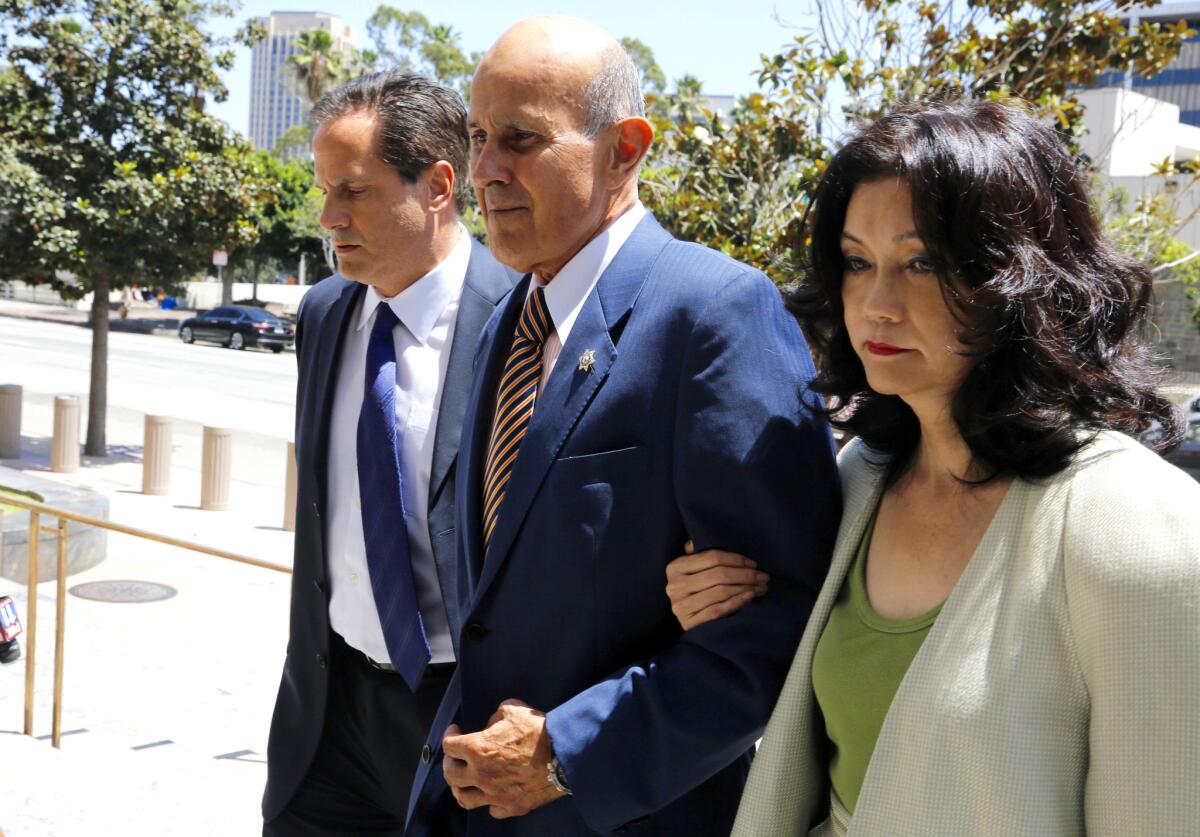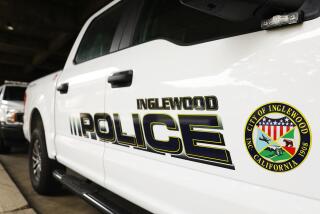Potential jurors in trial of ex-Sheriff Lee Baca tell of stories about corruption and beatings in the L.A. jails

Former Los Angeles County Sheriff Lee Baca and his wife, Carol, arrive at federal court in Los Angeles earlier this year. He is charged with conspiring to obstruct justice, obstructing justice and making false statements to the federal government.
- Share via
As jury selection in the criminal trial of former Los Angeles Sheriff Lee Baca continued Tuesday, lawyers and the federal judge in the case weeded out potential jurors who had already formed opinions about the high-profile public figure and the scandal that ended his career.
One prospective juror said a close friend was a guard at one of the county’s main jails in downtown Los Angeles and his cousin was a sheriff’s deputy. Both, he said, had told him about “corruption” they had witnessed on the job.
Asked if he’d be able to set that information aside and remain open minded about Baca, the man replied he could not. U.S. District Judge Percy Anderson excused the juror.
Another woman was excused after she said a family member had witnessed a beating while briefly in custody at L.A. County jail and told her, “This is not right.”
“You just hear a lot of stories about county jail and how you’re treated and stuff,” she said.
By mid-afternoon, the judge had excused a dozen potential jurors for their biases during the second full day of jury selection. Anderson questioned more than 40 people throughout the day about their thoughts on and experiences with law enforcement, the jails and the sheriff. The questioning highlighted the challenges of picking a panel free of those exposed to the extensive media coverage of the case or with personal experiences with law enforcement that colored their view.
By day’s end, a jury had been assembled. Opening statements in the trial are scheduled for Wednesday morning.
Baca faces charges of obstruction of justice and conspiracy stemming from allegations that he and other sheriff’s officials tried to interfere with an FBI investigation into abuses by deputies working in county jails. If convicted, the 74-year-old Baca, who is in the early stages of Alzheimer’s disease, is likely to be sentenced to several years in prison.
Some members of the jury pool knew snippets of information about the criminal case.
One man, an employment attorney, said he was aware of a plea deal Baca struck this year with prosecutors, in which the former sheriff admitted to lying to investigators. The agreement, which called for up to six months in prison, fell apart when Anderson decided it was too lenient on Baca.
A UCLA psychiatry professor and a former nurse said they had heard of the ex-sheriff’s Alzheimer’s diagnosis, something prosecutors have fought to keep jurors from hearing about.
The final jury of six men and six women included the psychiatry professor, as well as an accountant, marketing analyst, medical assistant and a college student studying communications. The employment attorney was not seated.
Tuesday’s proceedings were held in open court after Anderson, who had closed the court to the public and the press Monday without explanation, reversed course and opened his courtroom.
The judge only permitted reporters and spectators into his courtroom after an attorney for the Los Angeles Times and Southern California Public Radio informed Anderson’s courtroom deputy that the media organizations intended on formally objecting to the closure.
The deputy told a Times reporter on Monday that Anderson had excluded the public for “sensitive questions” asked of prospective jurors, including whether they had family members who have had run-ins with the police. Those type of questions, however, are routinely asked in open court.
Peter Scheer, executive director of the First Amendment Coalition, a nonprofit open-government advocacy group, said the judge appeared to be taking “an extreme step” that should be allowed only in extraordinary circumstances.
“The 1st Amendment requires that the court do whatever it can to maximize public access through the press,” he said. “The privacy concern of the juror is a legitimate interest, but that is not sufficient to exclude the press categorically.”
The U.S. Supreme Court held in a 1984 criminal case involving the rape and murder of a teenage girl that the questioning of jurors was presumed part of the open court proceeding, dating to Colonial times.
“Closed proceedings, although not absolutely precluded, must be rare and only for cause shown that outweighs the value of openness,” the court decided in that case.
For more news on the federal corruption trial of former L.A. County Sheriff Lee Baca, follow us on Twitter @vicjkim and @joelrubin
ALSO
Warning about plot to blow up Universal City station prompts heightened security across L.A.
Slain USC professor Bosco Tjan recalled for his generosity, empathy, humor and love
New era begins in L.A. County government as ‘supermajority’ of Democrats takes the helm
UPDATES:
7:15 p.m.: This article was updated with details from jury selection on Tuesday.
12:45 p.m.: This article was updated with the judge’s decision to open the courtroom.
This article was originally published at 8:05 p.m. on Dec. 5.
More to Read
Sign up for Essential California
The most important California stories and recommendations in your inbox every morning.
You may occasionally receive promotional content from the Los Angeles Times.












